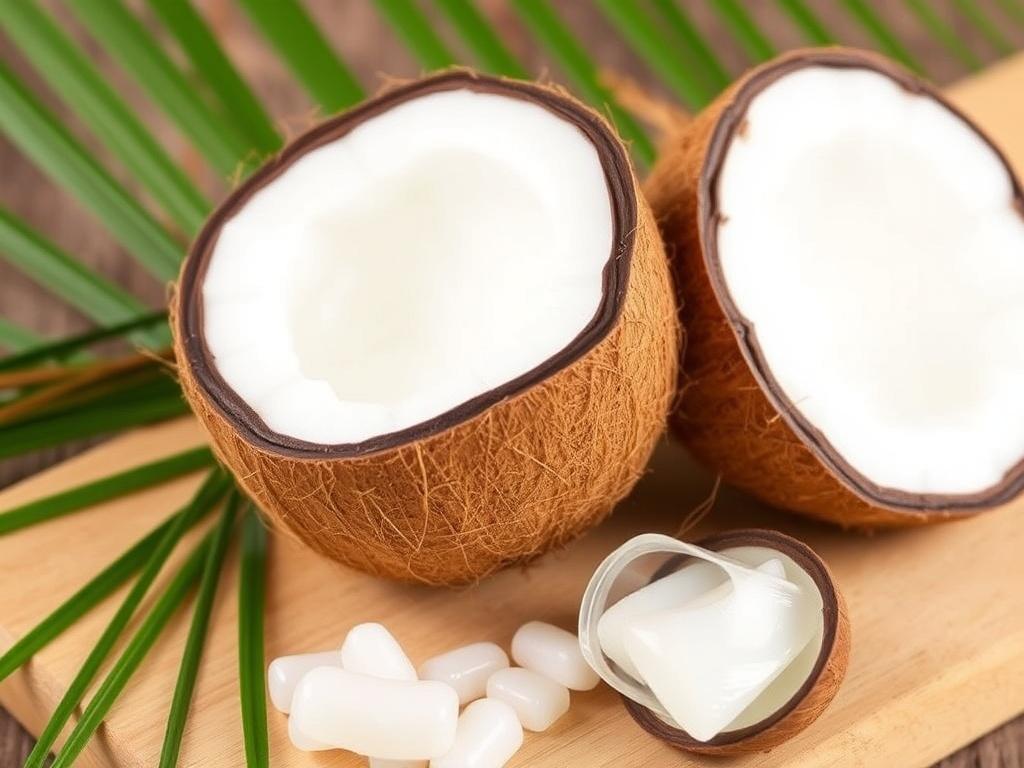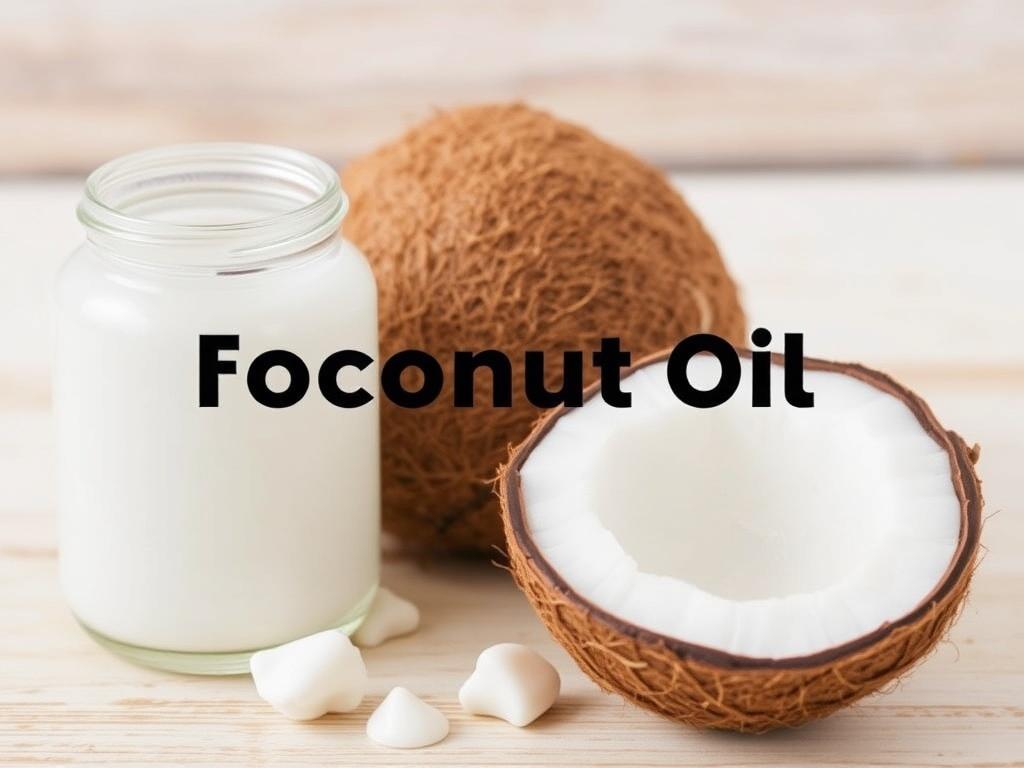Содержание статьи
- 1 What Makes Coconut Oil So Popular in Skincare?
- 2 Top Benefits of Using Coconut Oil for Skin
- 3 How to Use Coconut Oil for Skin: Tips and Techniques
- 4 Potential Risks and Side Effects of Coconut Oil on Skin
- 5 Comparing Coconut Oil with Other Natural Oils for Skin
- 6 Frequently Asked Questions About Coconut Oil for Skin
- 7 Summary Table: Benefits and Risks of Coconut Oil for Skin
When it comes to natural skincare remedies, coconut oil has captured the spotlight like few other products. From beauty bloggers to dermatologists, many people talk about the benefits of coconut oil for skin. It seems almost magical—moisturizing, healing, and even anti-aging. But is coconut oil really a cure-all for your skin? Like any natural product, coconut oil comes with its set of benefits and risks, and understanding both sides is essential before making it a staple in your skincare routine.
In this article, we will explore coconut oil for skin in detail. You’ll learn about its many benefits, how to use it effectively, potential side effects, and some expert tips to ensure you get the best results. So, whether you are battling dry skin, interested in natural remedies, or just curious about coconut oil, this guide is for you.
What Makes Coconut Oil So Popular in Skincare?

Coconut oil is derived from the kernel or meat of mature coconuts harvested from the coconut palm. It’s rich in fatty acids, vitamins, and antioxidants, which contribute to its moisturizing and healing properties. The appeal of using coconut oil for skin lies in its natural origin, affordability, and versatility. You can use it as a moisturizer, makeup remover, lip balm, or even to soothe sunburns.
Moreover, coconut oil contains lauric acid, a type of fatty acid known for its antimicrobial qualities. This means it may help fight off bacteria and fungi that can aggravate skin conditions like acne or infections. Plus, its unique combination of nourishing components helps strengthen the skin’s barrier, locking in moisture and preventing dryness.
Key Nutrients in Coconut Oil That Benefit the Skin
| Nutrient | Skin Benefit | Description |
|---|---|---|
| Lauric Acid | Antimicrobial and anti-inflammatory | Helps reduce acne-causing bacteria and soothes irritated skin |
| Vitamin E | Antioxidant and skin repair | Protects skin from free radicals, supports healing and prevents premature aging |
| Caprylic Acid | Antifungal | Helpful for skin infections such as fungus or yeast infections |
| Medium-Chain Fatty Acids | Moisturizing and barrier protection | Retains moisture and strengthens the skin’s natural barrier |
Top Benefits of Using Coconut Oil for Skin

Let’s dive into the various benefits of coconut oil for skin that have led to its widespread popularity in natural beauty routines.
1. Deep Moisturization for Dry Skin
Coconut oil is an excellent natural moisturizer. Its fatty acids penetrate deep into the skin, providing intense hydration without leaving a greasy residue. It is particularly beneficial for people with dry or rough skin, as it helps replenish lost moisture and softens the skin texture. Regular application of coconut oil can make dry patches disappear and leave your skin feeling silky smooth.
2. Soothes Eczema and Psoriasis
Skin conditions like eczema and psoriasis often cause redness, itching, and inflammation. Coconut oil’s anti-inflammatory properties help soothe these symptoms, calming irritated skin. Some studies suggest coconut oil reduces dryness and itchiness associated with eczema by reinforcing the skin barrier and reducing transepidermal water loss.
3. Antibacterial and Antifungal Properties
Thanks to lauric acid and other antimicrobial compounds, coconut oil can fight off harmful bacteria and fungi on the skin surface. This is especially useful for minor cuts, scrapes, or fungal infections like athlete’s foot or candida. Using coconut oil as a topical application may promote faster healing and reduce the risk of infection.
4. Natural Makeup Remover
Coconut oil is gentle yet effective at breaking down makeup, even stubborn waterproof formulas. It cleanses the skin without stripping away natural oils, making it an excellent choice for sensitive skin. Plus, it leaves the skin moisturized and soft after cleansing.
5. May Help with Acne – With Some Caution
The antimicrobial effects of coconut oil suggest it could help combat acne-causing bacteria. Additionally, its anti-inflammatory properties may reduce redness and swelling of pimples. However, it’s important to note that coconut oil is comedogenic, meaning it can clog pores in some individuals, especially those with oily or acne-prone skin. We’ll discuss this risk more below.
6. Anti-Aging Effects
Your skin naturally loses collagen and elasticity as you age, leading to wrinkles and sagging. Coconut oil’s antioxidant content, mainly vitamin E, can fight free radicals that damage skin cells and accelerate aging. Although it’s not a fountain of youth, regular use might help maintain a youthful glow and reduce fine lines over time.
How to Use Coconut Oil for Skin: Tips and Techniques

Knowing how to properly incorporate coconut oil into your skincare routine can maximize its benefits and minimize potential drawbacks. Here are some practical tips and ways to use coconut oil for skin:
- Patch Test First: Always do a patch test before applying coconut oil to your face or large skin areas. Apply a small amount on your inner arm and wait 24 hours to check for allergic reactions or irritation.
- Choose Virgin or Extra Virgin Coconut Oil: For the highest quality, use unrefined virgin coconut oil. It retains most of its beneficial nutrients without harsh processing.
- Use as a Moisturizer: After cleansing your face, warm a small amount of coconut oil between your palms and gently apply it to your skin. Use sparingly to avoid a greasy feeling.
- Makeup Remover: Apply a small amount to your face and gently massage to dissolve makeup. Wipe off with a warm washcloth or rinse with water.
- Body Moisturizer: Coconut oil works wonders on dry body parts like elbows, knees, heels, and hands. Apply after showering to lock in moisture.
- Spot Treatment: For dry patches or flaky areas, dab coconut oil at night and let it absorb while you sleep.
- Hair and Skin Combo: Coconut oil can also be used as a hair mask or scalp treatment, making it a versatile natural beauty product.
Potential Risks and Side Effects of Coconut Oil on Skin
Despite its many benefits, coconut oil can cause problems for some people, especially when used on facial skin or if you have certain skin conditions. It’s important to understand the potential risks before making it a daily habit.
1. Comedogenic Potential: Can Coconut Oil Clog Your Pores?
Coconut oil has a comedogenic rating of 4 out of 5, which means it is quite likely to clog pores and promote blackheads or whiteheads, especially if you have oily or acne-prone skin. For these skin types, coconut oil may exacerbate acne rather than improve it. If you notice breakouts or increased redness after using coconut oil, it might not be suitable for your skin.
2. Allergic Reactions and Sensitivities
Though rare, some people may develop allergic reactions to coconut oil, causing redness, itching, or swelling. This is why patch testing is essential. If you have a known allergy to coconut or tree nuts, it’s better to avoid using coconut oil on your skin altogether.
3. May Worsen Fungal Acne
Fungal acne is a type of acne caused by yeast that lives on the skin. Coconut oil’s fatty acids can sometimes feed this yeast, potentially worsening the condition. If you suffer from fungal acne, consult your dermatologist before using coconut oil products.
4. Greasiness and Residue
Depending on your skin type and how much you apply, coconut oil can leave a heavy, greasy residue on the skin. This might be uncomfortable for some users, especially in warm or humid climates where oily products feel unpleasant.
Comparing Coconut Oil with Other Natural Oils for Skin
Natural oils are popular for skincare, but how does coconut oil stack up against others? Here’s a quick comparison that might help you decide if coconut oil is the right choice for your skin.
| Oil | Comedogenic Rating | Best For | Unique Benefits |
|---|---|---|---|
| Coconut Oil | 4 (high) | Dry and normal skin | Antimicrobial; great moisturizer; good for healing |
| Jojoba Oil | 2 (low) | Oily and acne-prone skin | Closely mimics skin’s natural sebum; balances oil production |
| Argan Oil | 0 (non-comedogenic) | All skin types, including sensitive | Rich in vitamin E; anti-aging and skin-repairing |
| Rosehip Seed Oil | 1 (low) | Dry, mature, and scars | High in antioxidants and essential fatty acids; reduces scars and hyperpigmentation |
| Olive Oil | 2 (moderate) | Dry skin | Antioxidants; deeply moisturizing but may feel heavy |
Frequently Asked Questions About Coconut Oil for Skin
Is coconut oil good for sensitive skin?
Coconut oil can be soothing for sensitive skin due to its anti-inflammatory properties, but the high comedogenic rating means it might clog pores or cause breakouts in some people. It’s best to patch test and start with small amounts.
Can I use coconut oil on my face every day?
Yes, if your skin tolerates it well and doesn’t react negatively. Use small amounts and apply to clean skin. However, those with oily or acne-prone skin should be cautious.
Does coconut oil help with wrinkles?
While coconut oil is not a cure for wrinkles, its antioxidants help protect skin from free radical damage, which can slow down the formation of wrinkles and promote healthier, plumper skin.
Can coconut oil treat acne?
Coconut oil’s antimicrobial properties might help reduce acne caused by bacteria, but due to its pore-clogging tendency, it can worsen acne in some people. It’s a hit or miss depending on your skin type.
What type of coconut oil is best for skin?
Virgin or extra virgin unrefined coconut oil is the best option, as it retains the maximum nutrients and healing properties.
Summary Table: Benefits and Risks of Coconut Oil for Skin
| Benefits | Risks |
|---|---|
| Deep moisturization and skin softening | May clog pores and cause acne (comedogenic) |
| Anti-inflammatory and soothing for eczema | Possible allergic reactions in sensitive individuals |
| Antibacterial and antifungal properties | May worsen fungal acne or yeast infections |
| Effective natural makeup remover | Can leave greasy residue if over-applied |
| Contains antioxidants for anti-aging effects | Not suitable for all skin types, especially oily or acne-prone skin |
Conclusion
Coconut oil for skin offers a wealth of benefits—deep hydration, soothing inflammation, fighting microbes, and providing antioxidant protection. Its natural origin and versatility make it an appealing choice for many seeking a simple, affordable skincare solution. However, like all products, coconut oil is not without risks. Its high comedogenic rating means it can clog pores and exacerbate acne for some users, while others might experience allergic reactions or find it too greasy for everyday use. Ultimately, whether coconut oil is right for you depends on your skin type, concerns, and preferences. If you decide to try it, start slowly, perform a patch test, and observe how your skin reacts. With a careful approach, coconut oil can be a helpful addition to your natural skincare routine, providing nourishing care with nature’s tropical touch.

